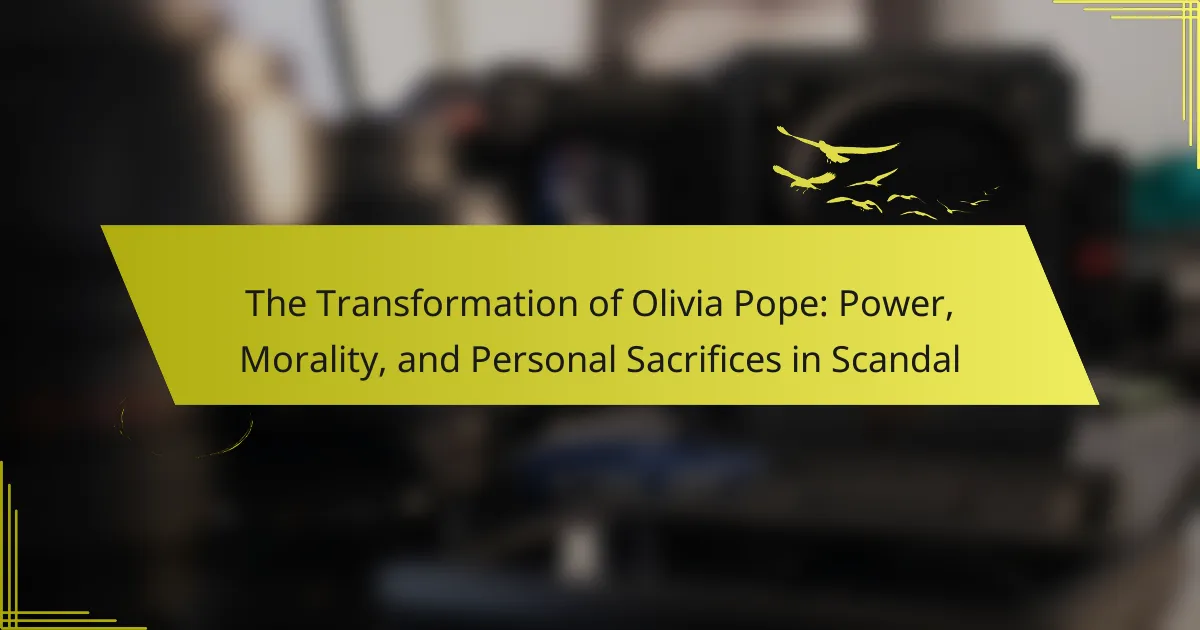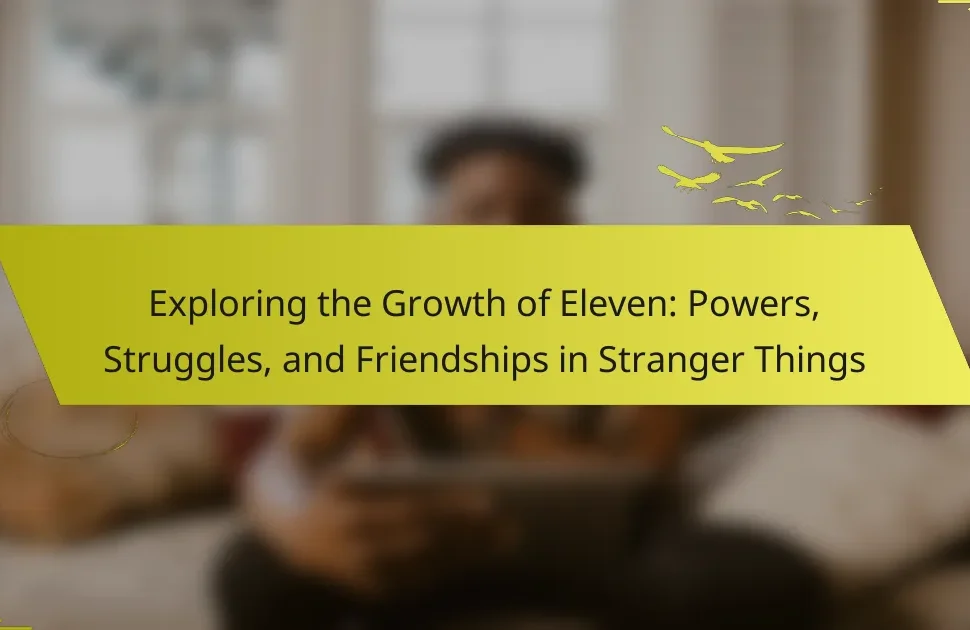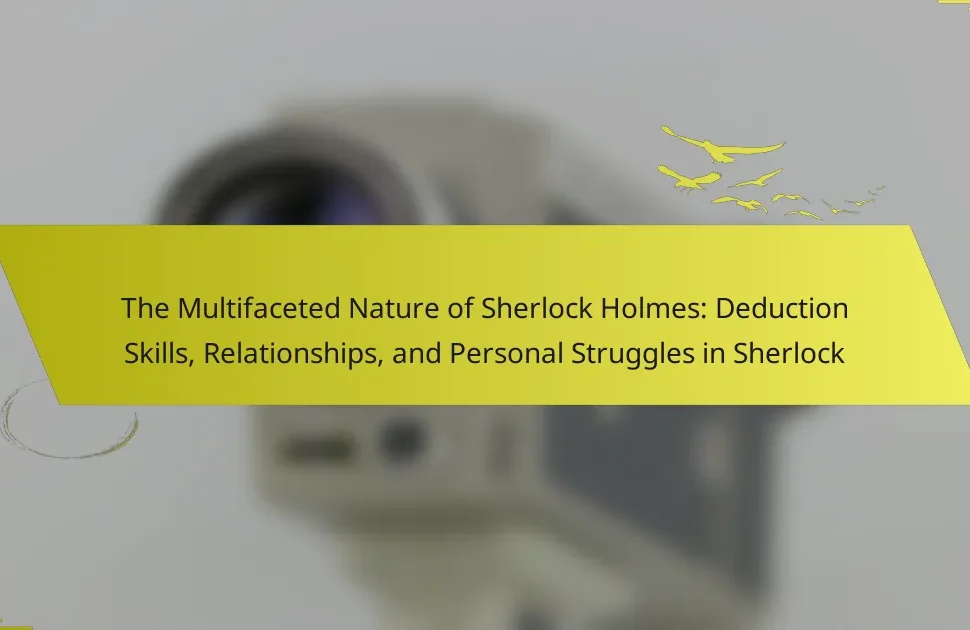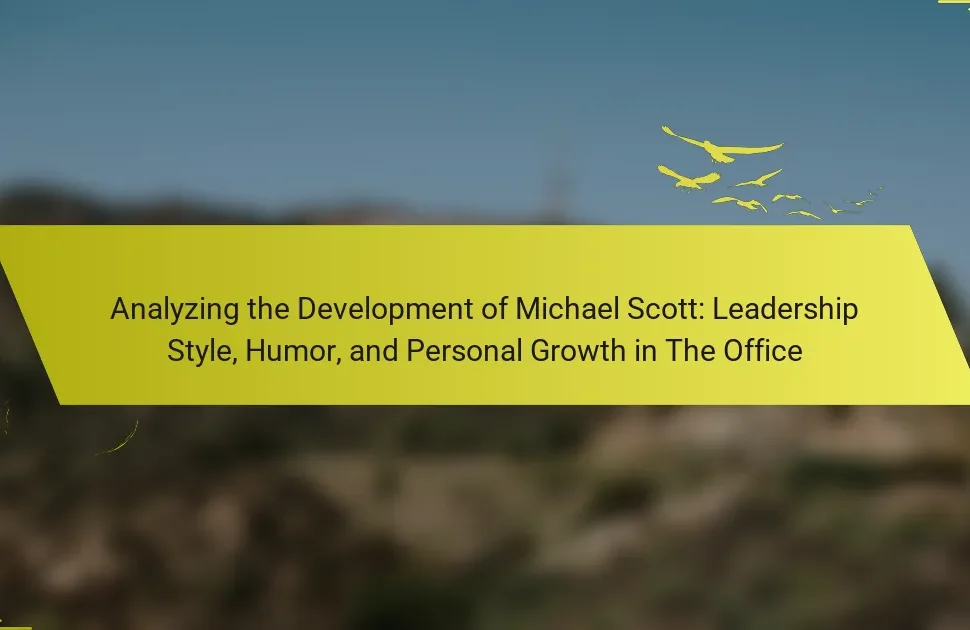Olivia Pope is the central entity in the analysis of her transformation throughout the television series Scandal. This article examines her evolution from a political fixer to a leader grappling with moral complexities. Key themes include the tension between personal ambition and ethical responsibility, as well as the sacrifices Olivia makes for her loved ones. The article also critiques the implications of her choices on the political landscape and the inherent costs of leadership. Through this exploration, Olivia’s journey reflects broader societal issues related to power and morality.
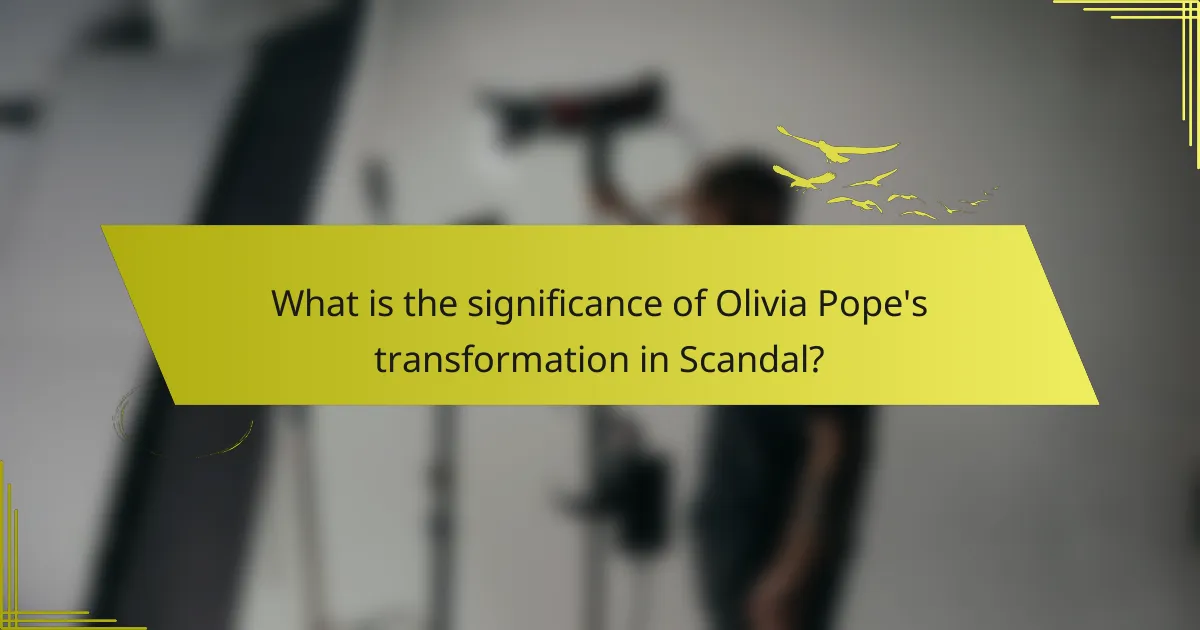
What is the significance of Olivia Pope’s transformation in Scandal?
Olivia Pope’s transformation in Scandal signifies her journey from a political fixer to a morally complex leader. Initially, Olivia embodies the archetype of a powerful woman in control. As the series progresses, her decisions increasingly reflect the moral dilemmas of power. This shift highlights the conflict between personal ambition and ethical responsibility. Olivia’s transformation reveals the sacrifices she makes for those she loves and the consequences of her choices. Ultimately, her evolution serves as a critique of the political landscape and the cost of leadership.
How does Olivia Pope’s character evolve throughout the series?
Olivia Pope’s character evolves from a skilled crisis manager to a morally complex leader. Initially, she is portrayed as a strong, independent woman who solves problems for powerful clients. As the series progresses, her personal relationships complicate her professional decisions. Olivia grapples with ethical dilemmas, often blurring the lines between right and wrong. Her romantic involvement with President Fitzgerald Grant introduces personal stakes that affect her judgment.
Throughout the series, Olivia’s ambition grows, leading her to make sacrifices for power. She becomes more ruthless, sometimes prioritizing her goals over her values. The impact of her choices leads to significant consequences for herself and those around her. By the end of the series, Olivia emerges as a more nuanced character, balancing her desire for power with the repercussions of her actions. This evolution reflects her journey through love, betrayal, and self-discovery.
What key events mark significant changes in Olivia’s character?
Olivia Pope undergoes significant character changes at various key events throughout “Scandal.” One pivotal moment is her decision to end her affair with President Fitzgerald Grant. This decision showcases her commitment to personal integrity over power. Another key event is her father’s revelation about her family’s dark past. This revelation profoundly impacts her understanding of loyalty and morality. Additionally, Olivia’s choice to run the Gladiators reflects her transition from a passive participant to an active leader. Each of these events marks a crucial turning point in her character development, highlighting her evolving values and priorities.
How do her relationships influence her transformation?
Olivia Pope’s relationships significantly influence her transformation throughout the series. Her connections with key characters shape her moral decisions and personal growth. For example, her relationship with Fitz Grant often complicates her professional life and personal ethics. This dynamic forces Olivia to confront her values and the sacrifices she must make. Additionally, her friendship with Abby Whelan provides a support system that encourages her to embrace her leadership role. Conversely, interactions with adversaries, like Cyrus Beene, challenge her resolve and push her to adapt. Each relationship acts as a catalyst for her evolving identity. The complexities of these connections drive the narrative of her transformation.
What role does power play in Olivia Pope’s journey?
Power is central to Olivia Pope’s journey as it shapes her identity and decisions. Olivia navigates the political landscape, using her influence to manipulate outcomes. Her role as a crisis manager highlights her strategic use of power. This power often leads to moral dilemmas and personal sacrifices. Olivia’s pursuit of power reflects her desire for control in a chaotic environment. The series showcases how power impacts her relationships and ethical boundaries. Ultimately, Olivia’s journey illustrates the complexities of wielding power in high-stakes situations.
How does Olivia’s perception of power shift over time?
Olivia’s perception of power shifts from seeking validation to embracing autonomy. Initially, she views power as a means to gain approval from others, particularly men. Over time, Olivia recognizes the importance of her own agency in wielding power. This shift is marked by her increasing confidence in making independent decisions. She learns that true power lies in self-determination rather than external validation. Olivia’s experiences with betrayal and moral dilemmas further refine her understanding. As she navigates complex relationships, she begins to prioritize her own values. Ultimately, her journey illustrates a transition from dependence on others to a strong sense of self-empowerment.
What are the consequences of Olivia’s pursuit of power?
Olivia’s pursuit of power leads to significant personal and moral consequences. She often compromises her values to achieve her goals. This results in strained relationships with friends and family. Olivia’s ambition causes her to make unethical decisions. She manipulates situations and people to maintain control. The quest for power also leads to isolation from her support system. Ultimately, Olivia faces emotional turmoil due to her choices. Her journey illustrates the complex relationship between power and morality.
How does morality factor into Olivia Pope’s decisions?
Morality significantly influences Olivia Pope’s decisions throughout the series “Scandal.” Olivia often grapples with ethical dilemmas that challenge her values. Her role as a crisis manager requires her to balance personal beliefs with professional obligations. She frequently prioritizes the greater good over individual morality. This leads her to make controversial choices, such as manipulating information or compromising her integrity. The complexity of her character is highlighted by her internal conflicts between right and wrong. For instance, her decisions often reflect a utilitarian approach, where outcomes justify the means. Olivia’s moral compass is further tested by her relationships and loyalty to friends and colleagues. These dynamics illustrate the ongoing struggle between her moral convictions and the demands of her powerful position.
What moral dilemmas does Olivia face throughout the series?
Olivia Pope faces several moral dilemmas throughout the series “Scandal.” She often struggles with the conflict between her personal ethics and her professional obligations. Olivia is frequently torn between loyalty to her friends and the greater good. She must decide whether to protect her clients or reveal the truth. Olivia also grapples with the implications of her romantic relationship with President Fitzgerald Grant. This relationship compromises her integrity and influences her decision-making. Additionally, she faces choices that involve the manipulation of information and the consequences of political power. Each dilemma tests her values and shapes her character development throughout the series.
How do her choices reflect her evolving moral compass?
Her choices illustrate an evolving moral compass by increasingly prioritizing ethical considerations over personal gain. Initially, Olivia Pope often made decisions based on pragmatic outcomes, focusing on power dynamics. As the narrative progresses, she begins to confront the consequences of her actions on others. This shift is evident when she chooses to protect innocent individuals, even at the cost of her own interests. For example, her decision to expose corruption demonstrates a commitment to justice. Additionally, her willingness to sacrifice relationships for the greater good highlights her moral growth. Ultimately, her choices reflect a deeper understanding of accountability and integrity.
What personal sacrifices does Olivia make for her career?
Olivia sacrifices personal relationships and her emotional well-being for her career. She often prioritizes work over her romantic life. This leads to strained relationships with partners, including Fitz. Olivia also distances herself from family and friends to maintain her professional focus. She frequently works long hours, sacrificing personal time and self-care. Additionally, she compromises her moral values to achieve career goals. These sacrifices contribute to her complex character and the challenges she faces in balancing power and personal life.
How do Olivia’s sacrifices impact her personal relationships?
Olivia’s sacrifices significantly strain her personal relationships. Her commitment to her career often leads to neglecting friends and family. This results in feelings of abandonment among those close to her. For instance, her relationship with her father becomes strained due to her choices. Additionally, her romantic relationships suffer as she prioritizes her work over emotional connections. Friends express frustration over her unavailability and emotional distance. Ultimately, Olivia’s sacrifices create a cycle of isolation and conflict in her personal life.
What does Olivia’s journey reveal about the cost of ambition?
Olivia’s journey reveals that the cost of ambition often includes personal sacrifices and moral dilemmas. Throughout her rise to power, Olivia faces numerous challenges that test her ethics. She struggles with the consequences of her decisions on her relationships. Her ambition leads to isolation from loved ones and moral compromises. Olivia’s pursuit of success often conflicts with her values. This tension highlights the sacrifices individuals make for their goals. Ultimately, her journey illustrates that ambition can come at a significant personal price. The narrative emphasizes that the pursuit of power may overshadow personal happiness and integrity.
How do Olivia Pope’s transformations relate to broader themes in Scandal?
Olivia Pope’s transformations reflect the broader themes of power, morality, and personal sacrifice in Scandal. Throughout the series, Olivia evolves from a crisis manager to a political player. This shift illustrates the complexities of wielding power and the moral compromises that accompany it. Her decisions often blur ethical lines, showcasing the show’s exploration of moral ambiguity. Additionally, Olivia’s personal sacrifices highlight the cost of ambition and the impact on her relationships. These transformations serve as a lens to examine the consequences of power dynamics in both personal and political realms. Each change in Olivia’s character reinforces the show’s central themes, making her journey emblematic of the series’ narrative.
What societal issues does Olivia’s character address?
Olivia Pope’s character addresses several societal issues, including race, gender dynamics, power struggles, and moral ambiguity. Her role as a powerful African American woman in a predominantly white political landscape highlights racial inequality. Olivia navigates sexism, illustrating the challenges women face in leadership roles. The series explores the ethical dilemmas of political maneuvering, showcasing the complexities of morality in high-stakes environments. Additionally, Olivia’s personal sacrifices reflect the societal pressures placed on individuals in pursuit of success and influence. These themes resonate with contemporary discussions about social justice and equality.
How does Olivia’s story resonate with audiences on a personal level?
Olivia’s story resonates with audiences on a personal level due to her complex moral dilemmas and relatable struggles. She embodies the challenges of balancing personal desires with professional responsibilities. Many viewers see their own conflicts reflected in her choices. Olivia’s journey illustrates themes of sacrifice, loyalty, and the pursuit of power. These universal themes evoke empathy and self-reflection among audiences. Her resilience in the face of adversity inspires viewers to confront their own challenges. The emotional depth of her character fosters a strong connection with the audience. Olivia’s experiences prompt discussions about ethics and personal integrity in real-life situations.
What lessons can be learned from Olivia Pope’s transformation?
Olivia Pope’s transformation teaches the importance of resilience and adaptability in the face of challenges. Throughout her journey, Olivia navigates complex moral dilemmas and personal sacrifices. She demonstrates that power can be both a tool and a burden. Olivia’s story emphasizes the necessity of making difficult choices to achieve one’s goals. Her character reveals that personal integrity can be compromised in pursuit of success. Additionally, Olivia’s evolution highlights the impact of leadership and influence on one’s identity. Ultimately, her transformation illustrates the consequences of prioritizing ambition over personal relationships. Each lesson serves as a reflection of the intricate balance between power and morality.
How can viewers apply Olivia’s experiences to their own lives?
Viewers can apply Olivia’s experiences by reflecting on her moral dilemmas and personal sacrifices. Olivia navigates complex situations that often require difficult choices. By analyzing her decisions, viewers can gain insights into their own ethical challenges. They can learn the importance of standing firm in their values. Additionally, Olivia’s resilience in facing adversity can inspire viewers to overcome their own obstacles. Her journey highlights the significance of self-awareness and accountability. These lessons can be applied in both personal and professional contexts. Ultimately, viewers can use Olivia’s story as a framework for making informed decisions in their lives.
What best practices can be derived from Olivia’s journey of power and morality?
Best practices from Olivia’s journey of power and morality include prioritizing ethical decision-making. Olivia’s choices often reflect the importance of aligning actions with personal values. She demonstrates the need for transparency in leadership roles. Olivia’s experiences show that accountability fosters trust among peers. Additionally, maintaining strong personal relationships is crucial for moral support during challenging times. Her journey illustrates the balance between ambition and ethical considerations. Lastly, embracing vulnerability can lead to personal growth and resilience. These practices highlight the significance of integrity in navigating power dynamics.
The main entity of the article is Olivia Pope, a character from the television series Scandal. The article examines Olivia’s transformation from a political fixer to a morally complex leader, highlighting her internal conflicts between ambition and ethical responsibility. Key discussions include her evolving perception of power, the impact of her relationships on her character development, and the personal sacrifices she makes for her career. The narrative also addresses broader themes such as race, gender dynamics, and the cost of ambition, providing insights into the moral dilemmas Olivia faces and the lessons that can be drawn from her experiences.
